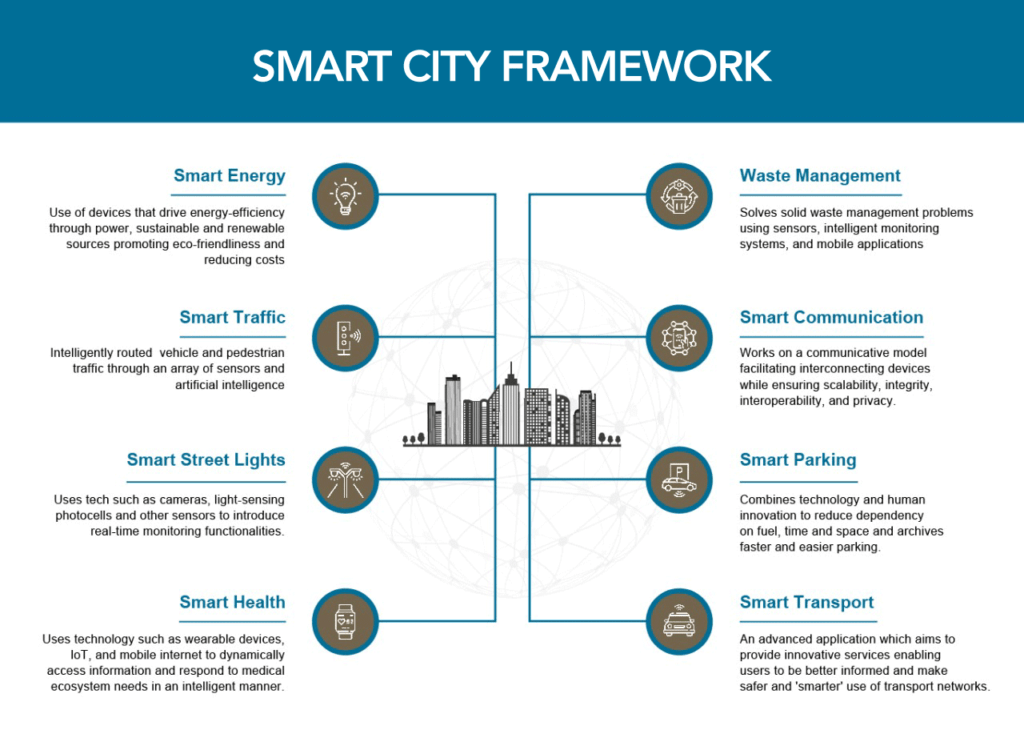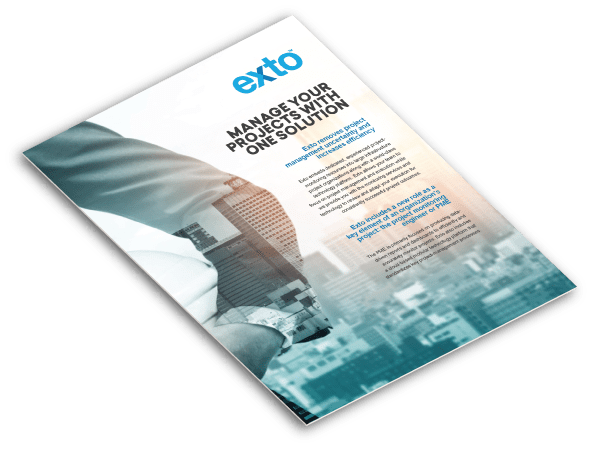Smart City Infrastructure Requires Smart Construction Software
Global urbanization is occurring on a massive scale. Nearly 70% of the human population is expected to live in urban areas by 2050. As the developing world grows, it’s more important than ever to design cities that can service modern human needs without draining the planet’s natural resources.
Smart city projects can provide some respite here. Whether it’s outfitting older cities with smart-city protocols (like in Barcelona or Seoul) or building new greenfield projects (like Amravati in India and some Chinese cities), smart cities offer a sustainable way forward for an urban lifestyle in the 21st century.
These large-scale smart city projects harness the power of technology with insight from big data to automate processes and build compact urban forms that seamlessly provide a high quality of living for its inhabitants.
Cities are the major economic engine for a nation. At their core, they are places where people congregate, travel, and find work. The design and planning of these urban areas are crucial to a nation’s economic health.
One of the drivers of smart city projects is developing economies hoping to play catch up with richer nations, and provide a higher living standard for their growing masses. These involve new cities built from scratch and designed to function around the entire smart city ethos. Meanwhile, in already developed nations, certain smaller-scale projects using IoT are being gradually implemented in older non-smart cities.
Whichever approach is taken, it’s clear the smart city revolution will play a big role in the future of urban construction.
The Global Construction 2030 report published by Oxford Economics and Global Construction Perspectives highlights the ever-growing scale of major smart city projects—an area that is predicted to grow by 85% over the next 40 years.
Let’s look at some key areas in this space.
What Does it Mean to Make a City Smart?
Making a city smart isn’t just about the basic infrastructure, it’s about how data and data-driven choices affect the city’s inhabitants. By advancing data collection, data analysis, and applying data to make informed choices, cities can drive infrastructure and money where it’s needed most.
In a longer timeframe, this data can be used to decide the location of new infrastructure, housing, commercial development, and so on. The possibilities are endless.
For the decisions to be impactful, and to deliver tailored solutions, a city will require a vast and constant flow of data at the hands of its decision makers in order to allow multiple task management. This data has to come from trusted, relevant sources, it has to be interconnected, and it has to be updated frequently. This does bring up important issues of privacy, so it is very important to use software with strong data security.
To ensure the successful integration of such measures, smart city projects look toward tnternet of things (IoT) use cases. IoT refers to the interactions and cooperations between everyday devices which are connected through the internet. This can mean anything from LED lights to cooling systems, or self-driving cars. All these devices share and communicate data about their local environment to each other.

Smart Cities in India
India is one of the big countries looking into creating a smart city. Urbanization is an important piece of the economic development puzzle. How cities are designed affects economic interactions in the most important regions of a country. Official government estimates place 35% of the Indian population in Urban areas, but this population generates nearly 70% of Indian GDP, and accounts for 90% of the revenue for the government.
Around 480 million people in India live in urban regions. This number is expected to rise to 600 million by 2030. Three of the world’s biggest megacities are in India: the Mumbai metropolitan regional plays host to 26 million people, Delhi to 32 million, and Kolkata to 14 million.
The country’s cities are affected by major issues that are hampering GDP growth and obstructing proper urban development.
As the Indian state continues to industrialize and urbanize, more and more people migrate from their villages and rural areas to urban ones seeking employment and greener pastures.
What they encounter instead is poor local governance, caused by low financing and overstressed services that cannot keep up with the growing populace.
Additionally, a lack of smart infrastructure and urban services, as well as nonexistent urban planning, present huge challenges that hinder Indian cities.
Local city governments and municipal corporations cannot keep up with the exploding urban population. Urban services such as policing, waste management, electricity supply systems, water supply networks, and even educational institutions are frequently overwhelming.
Exto’s Integrated Data Management is Helping to Deliver Smart Cities
Exto’s work management platform can help in the building, rolling out, and maintenance of such measures in several smart city projects. Using IoT implementation, and sensors like RFID tags, the Indian government hopes to carry out smart public transport, safe and effective policing, proper waste management, and sustainable energy usage. Exto helps in the management and effective interplay between these devices and services.
India’s Smart Cities Mission
To meet the growing demands of its urban populace, the Indian government is looking toward smart city projects. The futuristic and self-sufficient cities approach would be sustainable, efficient, and resource-rich allowing the government to plan infrastructure while growing in a sustainable manner.
The Indian Smart Cities Mission has a dual-pronged approach; unleashing economic growth by urbanizing, while also improving the lives of citizens across the country by kindling sustainable urban development and harnessing the power of smart technology to do so.
The government has identified 100 cities in different states and tendered a total of 6929 projects for its smart city initiatives.
These plants currently amount to a $26 billion budget, offering massive investment opportunities, and, if realized well, creating sustainable and efficiently managed cities for Indians.
Building such complex and integrated city ecosystems requires deep platforms to be able to handle massive projects.
Exto work management is ideal for these projects, while Exto services help manage the massive troves of data required to run such complex ecosystems.
Whether it’s artificial intelligence (AI) enhanced cameras, CCTVs that detect suspicious activity automatically alerting police or terror task forces, or the management of huge data centres required to bring these together, Exto helps stakeholders manage end-to-end operations seamlessly.
Other Smart City Projects Around the World
India isn’t the only country interested in smart cities. Governments worldwide have trialed out smart city infrastructure at various scales. Notable smart city projects include:
The Las Vegas smart city push involves smart sensors managing traffic by anticipating traffic jams and resolving them before they happen, automated systems for law enforcement, and eventually integration of smart city projects in all aspects of city governance by 2025.
Chinese megaplans are fairly more ambitious than most. The government is building more than 500 smart cities. Cities like Guangzhou and Chongqing aim to use AI to predict issues and manage traffic while building sustainable regions that balance green spaces with urban forms.
Copenhagen is using smart technology towards its plans of becoming the world’s first carbon-neutral city by 2025. The city’s innovative plans include processing waste into fuel, water-based infrastructure to heat and cool, and an open big data platform that will help institutions make informed decisions by leveraging data.
Barcelona implemented autonomous sensors that monitor traffic congestion, deliver energy-efficient street lighting, check air and noise pollution levels among others. The city also has an innovative waste management system that uses smart bins which suck waste into underground storage, thereby reducing the smell of trash and saving time and resources. This waste is later used as fuel for the heating system.
Busan, South Korea. Busan’s Eco-Delta Smart City is the most advanced attempt at creating a city for the future. It’s still in a quasi-experimental phase with little inhabitants, but it offers a compelling vision of the future. There are currently only 50 households in this city, all living rent-free (only paying for utilities) for a limited period. The data farmed from this city will be used by the South Korean government and other stakeholders to create and export a smart city model.
Residents say, all devices, even mirrors, and lights, are interconnected. Bedroom lights take into account your sleeping preferences and automatically wake you up. Bathroom mirrors analyze your health, and fridges automatically purchase groceries when they sense you’re low on items.
The overarching smart city vision is one of comfort and sustainability. Whether this model can be exported or even accepted throughout the world is yet to be determined. But it is certainly a city of the future.
Final Thoughts
Smart city projects require smart softwares to handle the interoperability of sensors, complex systems, data centers, and IoT devices.
Exto allows for seamless collaboration between public governments, contractors, and various other stakeholders, contractors.
We can help connect all the different aspects of a smart city project. Exto’s tools provide a single view of the project, help to manage and monitor construction progress, and can be used to communicate with all stakeholders.
As both urbanization and climate change are intensifying globally, we need to build sustainable urban forms that serve modern needs while also ensuring a greener tomorrow. Efficiently managed smart cities that improve urban living standards, while also being environmentally kind, can be the answer we need.
Begin your Construction Technology Transformation Journey Today
Schedule a demo today or review the brochure to begin your construction technology transformation journey.
